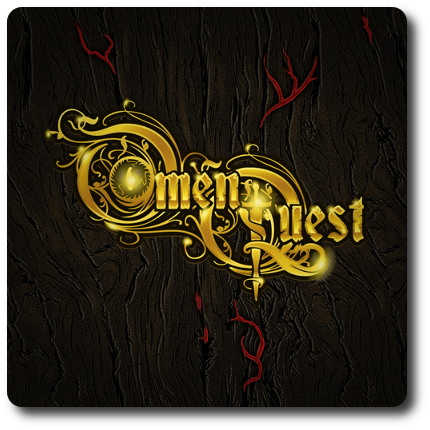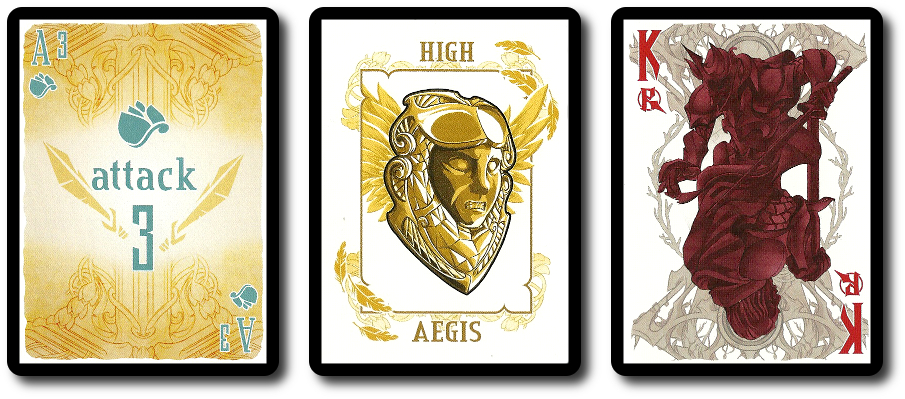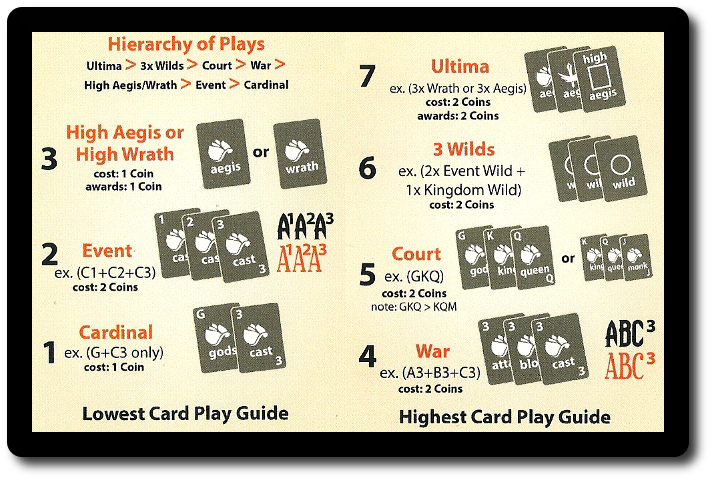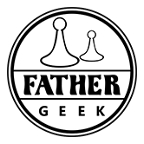Please Take Note: This is a review of the final game, but it might change slightly based on the success of the Kickstarter campaign. The game is being reviewed on the components and the rules provided with the understanding that “what you see is not what you might get” when the game is published. If you like what you read and want to learn more, we encourage you to visit the Kickstarter campaign. Now that we have all that disclaimer junk out of the way, on with the review.

The Basics:
- For ages 8 and up (publisher suggests 12+)
- For 2 or 4 players
- Approximately 20 minutes to complete
Geek Skills:
- Counting & Math
- Logical & Critical Decision Making
- Pattern/Color Matching
- Strategy & Tactics
- Risk vs. Reward
- Cooperative & Team Play
- Hand/Resource Management
Learning Curve:
- Child – Easy
- Adult – Easy
Theme & Narrative:
- The last stand for both Good and Evil
Endorsements:
- Gamer Geek mixed!
- Parent Geek approved!
- Child Geek mixed!
Overview
Throughout time and space, forces have battled against each other. Polar opposites, it’s in their nature to both repel and attract, destroy and create. This endless cycle is the root of all chaos. But now it will come to an end and one side of the cosmic forces will be all that remains. Join the battle and wage war to fight for victory. Only one side will be victorious. There is no room in existence for a runner-up.
Omen Quest, created and self-published by Corey Grant (better known by his social media handle Relephor) will reportedly be comprised of a number of coins, 20 Haven cards, 5 Round cards, and 64 playing cards. As this is a review of a prepublished game, I cannot comment on the game component quality or artwork.
Game Set Up
Note: The set up instructions provided here are for 2-player game. Refer to the “Game Variant” section below for a summary of a 4-player game set up.
To set up the game, first separate the Haven cards, Round cards, and the Instruction cards from the rest of the deck of playing card.
Second, shuffle the remaining playing cards and have each person decide if they will be playing as “Good” or “Evil”. Give the “Good” playing the “Good” Haven cards and the “Evil” player the “Evil” Haven cards.
Third, deal the playing cards face-down into two different stacks, one stack per player. Have each player select a stack and place it in front of them. This is the player’s Guild drawing deck.
Fourth, give each player 10 coins and draw 5 Guild cards each, placing them in their hand. Cards in the player’s hand should remain hidden until played. The player’s Haven cards can be placed next to their Guild draw deck.
That’s it for game set up. Time to play
Good vs. Evil
Omen Quest is played in rounds and turns. A typical game turn is summarized here.
Step 1: Burn Havens
A player is not limited to the number of type of cards they have in their hand. They can, if they so choose (as burning Haven cards is optional during this step) discard 3 of their Haven cards to draw more cards into their hand. This is a risky move, however, as a player will lose the game if they run out of Haven cards.
Step 2: Play a Card or Cards
A player now reviews their hand and decides how many cards they want to play. They can play a single card or play a combination of cards. The cards come in different categories (Ultimate, Kingdom, Event, and Wild), types (Aegis and Wrath) and suits (Sword, Tulip, Plague, and Revenant). Within the categories, types, and suits is a strict hierarchy that determines how strong one card is against another. For example, “3” beats a “2” and “Kings” beat “Masters”. There is also a system similar to Rock-Paper-Scissors that determine outcomes of card combat.

Given the wide variety of possible plays, a player must determine how many cards they want to use on their turn. At a minimum, a player must place 1 card from their hand into play. They can also play special combos. Doing so, however, will most of the time cost the player a coin or two. This adds an additional level of complexity to the game, as it’s not simply enough to have “good cards”, but the player must also be able to pay for them. The stronger the card or combo, the more it will cost the player to bring it into play. However, winning hands with combos rewards the player coins.

Players can also pull cards from their Guild draw deck by burning Haven cards or forfeit a hand (which greatly reduces overall loss) by paying a coin.
Winning the Round and Game
A game round is won when a player is unable to beat their opponent’s played cards. A new round then begins.
At the beginning of round 5, and only if the game is tied, bot players can replace their hand of cards by spending coins instead of Haven cards.
The game ends when it’s obvious that one player has won the most rounds in the game (for example, winning three rounds out of possible five makes you the winner of the game).
Game Variant
Four-Player Cooperative
Shuffle the deck of cards as normal and then divide into teams. Players on the same team pull from the same Haven cards and attempt to beat their opponents by playing off of each other.
To learn more about Omen Quest, visit the game’s official website.
Final Word
 The Child Geeks had a hard time getting into the game due mostly to the game’s large number of possible combos. According to one Child Geek, “All I can ever do is remember the easier card plays.” Even when given a guide, the Child Geeks tended to favor the lowest card plays. Only a few of the older Child Geeks risked it all by attempting to play the higher card plays. Most of the time I’m fairly certainly they did so because they had the majority of cards needed in their hand to start with. As one Child Geek put it, “What I do on my turn is pretty much determined by what cards I have in my hand at the start.” Which brings up another interesting fact. The Child Geeks did not once burn a Haven card to add cards to their hand. Once they understood that running out of Haven cards could trigger the endgame and an unwanted loss, they protected their Haven cards like they were the most precious thing on Earth. In the end, the game received a mixed review from the Child Geeks who never felt like the game engaged them on a level that kept them excited, but none the less entertained them.
The Child Geeks had a hard time getting into the game due mostly to the game’s large number of possible combos. According to one Child Geek, “All I can ever do is remember the easier card plays.” Even when given a guide, the Child Geeks tended to favor the lowest card plays. Only a few of the older Child Geeks risked it all by attempting to play the higher card plays. Most of the time I’m fairly certainly they did so because they had the majority of cards needed in their hand to start with. As one Child Geek put it, “What I do on my turn is pretty much determined by what cards I have in my hand at the start.” Which brings up another interesting fact. The Child Geeks did not once burn a Haven card to add cards to their hand. Once they understood that running out of Haven cards could trigger the endgame and an unwanted loss, they protected their Haven cards like they were the most precious thing on Earth. In the end, the game received a mixed review from the Child Geeks who never felt like the game engaged them on a level that kept them excited, but none the less entertained them.
 The Parent Geeks played the game very differently and attempted to duck and dodge as often as possible, reaching for the highest scoring cards, but ultimately always scoring in the mid-ranges. To say the Parent Geeks were conservative with their Haven cards would be something of a misstatement. I think they were “very careful” with them, but not nearly as much as their younger counterparts. According to one Parent Geek, “Haven cards, like coins, are currency in the game. You have to spend them to play, but there is such a thing as spending foolishly.” And that’s why I think the Parent Geeks had a much better time with the game than the Child Geeks. The Parent Geeks understood that Omen Quest was a game that made players pay for their risks upfront. While the Parent Geeks viewed this as a challenge, the Child Geeks saw this as a deterrent instead of a possibility. You have to pay to play, so to speak. As one Parent Geek put it, “One of the more challenging card games I have played with you in a while. I like it. It makes you think and consider your possible rewards compared to your known risks. This is a good game.” When the votes were in, the Parent Geeks decided to award Omen Quest their full endorsement.
The Parent Geeks played the game very differently and attempted to duck and dodge as often as possible, reaching for the highest scoring cards, but ultimately always scoring in the mid-ranges. To say the Parent Geeks were conservative with their Haven cards would be something of a misstatement. I think they were “very careful” with them, but not nearly as much as their younger counterparts. According to one Parent Geek, “Haven cards, like coins, are currency in the game. You have to spend them to play, but there is such a thing as spending foolishly.” And that’s why I think the Parent Geeks had a much better time with the game than the Child Geeks. The Parent Geeks understood that Omen Quest was a game that made players pay for their risks upfront. While the Parent Geeks viewed this as a challenge, the Child Geeks saw this as a deterrent instead of a possibility. You have to pay to play, so to speak. As one Parent Geek put it, “One of the more challenging card games I have played with you in a while. I like it. It makes you think and consider your possible rewards compared to your known risks. This is a good game.” When the votes were in, the Parent Geeks decided to award Omen Quest their full endorsement.
 The Gamer Geeks never really fell in love with Omen Quest, but that is not to say they didn’t enjoy it. According to one Gamer Geek, “I like what the game is doing and how it is doing it. Overall, though, the game it not really thrilling me. I think it has something to do with the rather standard method in which cards are played. It feels a bit mechanical at times and that sucks the life out of the fun to a point where I know I’m not as engaged with the game as I should be.” Another Gamer Geek said, “I like the risk and reward element and how everything comes at a cost. But more over, I think the game challenged me to consider both my long and short game, which is always fun. Risks short and long-term are not the same and must be weighed carefully.” The Gamer Geeks had no problems spending coins and burning Havens if they found it to be in their best interest, being far less conservative with their risk taking their counterparts. Not surprising considering their elite level of game aficionadoism, but wow, what a difference it made in the game. Rounds were more exciting and tense. When the games were over, the Gamer Geeks gave Omen Quest a mixed endorsement, finding it to be a game of promise and depth, but ultimately didn’t deliver the punch to the face they were hoping for.
The Gamer Geeks never really fell in love with Omen Quest, but that is not to say they didn’t enjoy it. According to one Gamer Geek, “I like what the game is doing and how it is doing it. Overall, though, the game it not really thrilling me. I think it has something to do with the rather standard method in which cards are played. It feels a bit mechanical at times and that sucks the life out of the fun to a point where I know I’m not as engaged with the game as I should be.” Another Gamer Geek said, “I like the risk and reward element and how everything comes at a cost. But more over, I think the game challenged me to consider both my long and short game, which is always fun. Risks short and long-term are not the same and must be weighed carefully.” The Gamer Geeks had no problems spending coins and burning Havens if they found it to be in their best interest, being far less conservative with their risk taking their counterparts. Not surprising considering their elite level of game aficionadoism, but wow, what a difference it made in the game. Rounds were more exciting and tense. When the games were over, the Gamer Geeks gave Omen Quest a mixed endorsement, finding it to be a game of promise and depth, but ultimately didn’t deliver the punch to the face they were hoping for.
 Omen Quest is a bit tricky at first. It doesn’t help that the game’s provided rules make some assumptions regarding the player’s overall game playing knowledge by not clearly spelling out specific steps of game play. The good news is that the game itself is straightforward and it’s very difficult to get lost while playing. This is due in part to the game’s “mechanical” method of game play that was mentioned by one of the Gamer Geeks. While I won’t go so far as to suggest it’s a bad thing, the method in which rounds are played and determined is quickly learned and then repeated without error.
Omen Quest is a bit tricky at first. It doesn’t help that the game’s provided rules make some assumptions regarding the player’s overall game playing knowledge by not clearly spelling out specific steps of game play. The good news is that the game itself is straightforward and it’s very difficult to get lost while playing. This is due in part to the game’s “mechanical” method of game play that was mentioned by one of the Gamer Geeks. While I won’t go so far as to suggest it’s a bad thing, the method in which rounds are played and determined is quickly learned and then repeated without error.
As for me, I found Omen Quest to be a fun distraction. It fits that spot for Gamer Geeks that provides for a card game of depth and lots of possibilities but is still approachable and comprehendible to non-gamers. The game seems to provide a little for everyone, which is also why it felt like it was lacking something. You cannot please everyone all the time, as such, Omen Quest does a great job of hooking in the players, but then leaves them feeling like they were missing something. Really, they are missing nothing. What’s happening here is a misplaced sense of anticipation of a big bang which the game was never really designed to deliver. You can see victory and defeat coming far enough ahead to make game outcomes obvious. It’s when you have a tied game where Omen Quest shows its teeth and the game becomes tense. Unfortunately, that was seldom the case.
Omen Quest will provide you with challenges and tough questions you must wrestle to answer, but never to a point where a player is stuck in a corner or pushed against a wall to make choices they don’t want to. This is a game that challenges you to take risks, but on your terms. This open-ended and soft-handed approach is welcoming to new players and completely ignored by skilled players. Do give the game a try if you are fond of card games. This one will challenge you to rethink your strategy and tactics in both the short and long-term.
This is a paid for review of the game’s final prototype. Although our time and focus was financially compensated, our words are our own. We’d need at least 10 million dollars before we started saying what other people wanted. Such is the statuesque and legendary integrity of Father Geek which cannot be bought except by those who own their own private islands and small countries.

